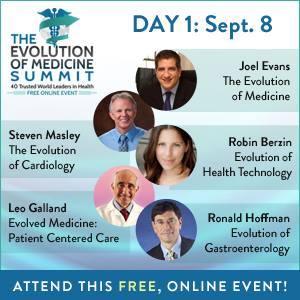Catch The Health Revolution Wave
Click on the link Today, to be a part of the Evolution of Medicine Summit. The largest functional medicine summit worldwide.
Free Registration Today!!
| Find Out More About the Summit Here |
| Find Out More About the Summit Here |
 Free Registration Here
Free Registration Here● Understand what causes disease and how to diseaseproof
yourself
● Elevate you and your family towards optimum health
● Make the most out of the next generation of health technology
Insightful article from one of our functional featured doctors. 
Autoimmune disease has become frighteningly common today. This degenerative condition, which can affect any tissue in the body or brain, happens when the immune system attacks and destroys the body as if it were a foreign invader. Chances are either you or someone you know has an autoimmune disease. Some of the more commonly known autoimmune diseases include Hashimoto’s hypothyroidism, multiple sclerosis, lupus, rheumatoid arthritis, type 1 diabetes, celiac disease, and psoriasis.
Although the statistics for autoimmune disease are alarming enough — it affects one in five people, the majority of them women — these numbers do not tell the whole story. The truth is the autoimmune process typically is underway long before the tissue damage is advanced enough for it to be diagnosed as a “disease.”
In fact, some people go an entire lifetime suffering from the symptoms of an autoimmune reaction that never progresses to the disease stage. This is because tissue damage and symptoms have to be quite severe or life threatening before conventional medicine can offer remedies in the way of steroids, chemotherapy drugs, or surgical removal.
This means untold numbers of people suffer from autoimmune reactions that cause symptoms but are not advanced enough to be diagnosed as disease. This creates confusion and frustration for the suffering patient.
For instance, someone with an autoimmune reaction to the pancreas may struggle with keeping her blood sugar stable despite eating a very good diet. This is because she is on the path to possibly developing type 1 diabetes. It’s estimated 10 percent of those with type 2 diabetes, a lifestyle-induced condition, also have pancreatic autoimmunity and thus markers for type 1 diabetes autoimmunity. Another example is autoimmunity that causes hypothyroidism — Hashimoto’s hypothyroidism. Patients are given thyroid hormone in ever increasing doses but are not instructed on how to dampen or halt the autoimmune attack on the thyroid gland.
People can also have symptoms that suggest multiple sclerosis, arthritis, brain disorders (depression, anxiety, loss of balance, loss of memory, etc.), poor adrenal function, irritable bowel, and others because their immune system is attacking the glands or tissues associated with those symptoms. However, the tissue destruction is not advanced enough to be labeled as a disease and hence medicine has little or nothing to offer.
Fortunately, functional medicine shines in this arena. Specialized lab testing can determine whether autoimmunity is affecting a number of different tissues. Testing can identify (or rule out) the source of chronic, mysterious, and undiagnosable symptoms, such as chronic fatigue, chronic pain, declining brain function, gastrointestinal issues, hair loss, weight gain or weight loss, and more.
This information can validate patients who have long been dismissed or belittled by their doctors for “making things up.” Testing can also uncover autoimmune reactions that are not causing any symptoms. For instance, a person may be producing antibodies (an autoimmune marker) to the sheaths that coat the nerves. In its progressed stage, this becomes multiple sclerosis. Knowing this kind of information can give you more incentive to avoid inflammatory foods and pursue other lifestyle choices that may lower your risk of that silent autoimmune reaction becoming a disease.
In functional medicine we use a variety of strategies to dampen autoimmunity and relieve symptoms. These strategies include an anti-inflammatory diet that removes foods to which you are sensitive and stabilizes blood sugar, minimizing your exposure to toxic chemicals and metals, adopting lifestyle habits that minimize stress and maximize well being (socializing, exercise, play time, laughter, etc.), and the use of natural compounds that dampen inflammation and support the balance of immunity, stress, gut health, and blood sugar.
Ask my office for more information.
I came across this post, when researching articles that shed light on strengthening one’s natural immunity. I think there is a lot to be said about taking steps to build up our cells. I especially liked this post due to using a topical Glutathione cream over the past couple of months, and being happy with the results. So here’s some sound advice for strengthening one’s natural immunity.
You’ve probably seen antioxidant labels on foods and supplements, but what does it mean exactly and what is the best antioxidant to choose? Antioxidant means it prevents oxidation, a process that happens to all cells in nature, including those in the human body. Oxidation happens when oxygen interacts with cells and it’s what makes an apple turn brown, metal rust, or food go rotten. In the body oxidation is a normal part of cell turnover. However, a small minority of oxidized cells become problematic “free radicals” that set off a chain reaction of damage, causing cells to mutate and behave abnormally. Free radicals reach us through pesticides, air pollution, cigarette smoke, excess alcohol, sunburn, junk foods, etc. 
The defense? Antioxidants. And our most powerful antioxidant is one the body makes called glutathione. To stay a step ahead of modern civilization we need to avoid free radicals as much as possible, eat an antioxidant-rich diet, and make sure our body is sufficient in glutathione.
The best source of antioxidants in the diet are colorful fresh fruits and vegetables. Since different plants contain different types of antioxidants, it’s important to eat a wide variety. Many supplements are also geared toward shoring up your body’s antioxidant supply.
Glutathione is such a powerful antioxidant it is called the master antioxidant. Glutathione protects cells from free radicals, is important for detoxification, and supports immune health. Many people with autoimmune conditions find plenty of glutathione is necessary to prevent or dampen autoimmune flares.
When we are healthy, when life is mellow, and when we eat a whole foods organic diet and avoid the use of toxic products, our bodies make sufficient glutathione. However, chronic stress depletes glutathione levels. This stress can come from toxins, poor diet, lack of sleep, smoking, excess sugar, and other stressors. Glutathione levels also decrease naturally as a result of aging.
Straight glutathione is not effective taken orally. Good deliveries of glutathione include a liposomal cream, nebulizer, suppository, or IV drip. However, S-acetyl glutathione is a newer form of glutathione that can be quite effective in helping to manage autoimmune disease when taken orally.
You can also raise glutathione levels inside the cells by taking certain precursor nutrients. This will help protect the cells’ mitochondria, which produce energy. Recycling glutathione means taking glutathione that has already been used and rebuilding it so it’s ready for action again. Good glutathione recycling will help you better manage an autoimmune disease and leaky gut.
The compounds that have been shown to support glutathione recycling include:
Boosting your antioxidant status and glutathione levels can play a profound role in managing autoimmune disease, inflammation, chemical sensitivities, food sensitivities, etc.
To learn more about how to increase your antioxidant and glutathione support, contact my office for advice.